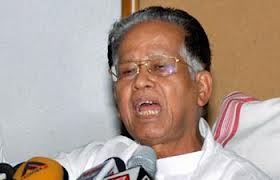
Guwahati, August 23: Tarun Gogoi, the beleaguered Chief Minister of Assam, has taken umbrage at comparisons being made between the Gujarat riots of 2002 and the ethnic clashes that have rocked his state in the last month; he says such comparison is "unfair."
"The Gujarat situation was sponsored by the state. They took months to control, thousands died. We controlled the situation within a week," Mr Gogoi told NDTV.
The CM now admits that there were initial delays in taking action when the Assam clashes began; delays he attributes to "shortage of forces and procedural delays", but he has lashed out at his detractors for the criticism that has come his way.
Mr Gogoi singles out senior BJP leader L K Advani, attacking him for accusing the Assam government of turning a blind eye to the problem of infiltration. "Advani misinterpreted my statement. I said a volcano-like situation in two districts, not the entire state. When Advani was the Home Minister, he didn't take any step like border fencing," the Congressman said.
The Assam clashes, which began as isolated incidents of murder in early July, within days turned into ethnic clashes between Bodos and Bengali-speaking migrants in four districts of lower Assam. Kokrajhar was the epicentre of the violence; almost 80 people have died and, at one point last month, 400,000 people who had fled their homes in fear crowded refugee homes set up by the government. Nearly two lakh have returned to their homes since.
Aftershocks of the clashes were felt in other parts of the country when morphed images and SMSes began to do the rounds creating panic among people from the North-East in cities like Bangalore and Pune. A few days saw many people board trains to go back home; special trains had to be run to meet the demand for train tickets to Guwahati. Mr Gogoi said, "Rumours spread like wild fire and created a sense of panic. They (students and others who rushed back home) are victims and we are encouraging them to go back. We have taken up the matter with the government to ensure that their jobs are retained."
Already reeling under the aftermath of the ethnic clashes in the state that have also earned him much criticism for what is seen by many as poor handling of the huge humanitarian crisis, Mr Gogoi also has some political storms to battle at home. His health minister Himanta Biswa Sarma, considered close to him, has reportedly resigned. Mr Gogoi refuses to comment on that but is more forthcoming on accusations that he is promoting his son, Gaurab, who has just joined politics. "How could I promote my son. He has just joined. Earlier, I was promoting Himanta, Pradyut Bordoloi, Rakibul Hussain," he said.





Comments
Add new comment